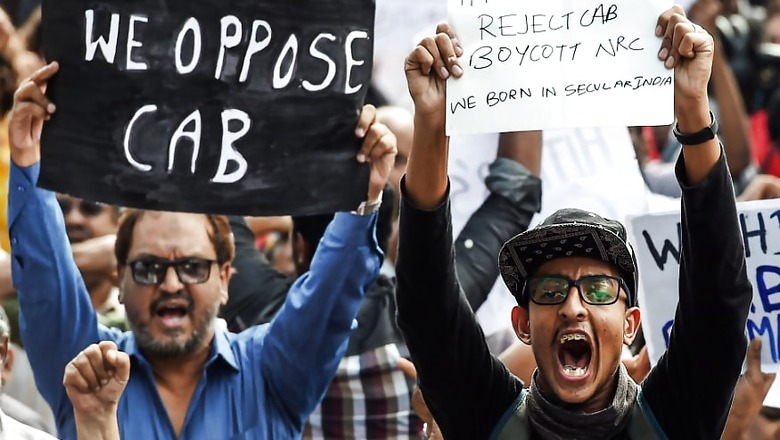
views
The row over citizenship is no longer confined to the digital world. It has become real, aggressive, violent and at many places across the country, spilled onto the streets.
Starting from the North East, an atmosphere of unrest has gripped the whole of India within 10 days of the passing of the Citizenship Amendment Act (CAA), with uncertainty particularly dominant among minorities. In the North East, the protest is for a different reason entirely: To protect its identity, culture and language from 'outsiders'.
The possibility of the National Register of Citizens (NRC) exercise being undertaken at a national-level has only compounded the confusion and fear, so much so that people have started collecting documents that might prove useful in proving citizenship. Till date, only Assam has gone through the NRC exercise twice, once in 1951 based on the 1951 Census data and again in 2019. With the NRC also coming into the picture when a state of incertitude already prevails in the country, the matter has become even more complicated.
On Friday, the government released an FAQ, the second one of its kind - the first, put out on Thursday, wasn't credited to any specific department or ministry. The primer, however, leaves some questions unanswered.
How far CAA is from NRC
This can be said to be the soul of the Citizenship Amendment Act, 2019: "Provided that any person belonging to Hindu, Sikh, Buddhist, Jain, Parsi or Christian community from Afghanistan, Bangladesh or Pakistan, who entered into India on or before the 31st day of December, 2014 and who has been exempted by the Central Government by or under clause (c) of sub-section (2) of section 3 of the Passport (Entry into India) Act, 1920 or from the application of the provisions of the Foreigners Act, 1946 or any rule or order made thereunder, shall not be treated as illegal migrant for the purposes of this Act."
Defined simply, the "NRC is the register containing names of Indian citizens". In 1951 in Assam, the NRC was prepared by recording particulars of all the persons enumerated during the 1951 Census. In the 2019 version of the NRC, it was updated "to include the names of those persons (or their descendants) who appear in the NRC, 1951, or in any of the Electoral Rolls up to the midnight of 24th March, 1971, or in any one of the other admissible documents issued up to midnight of 24th March, 1971, which would prove their presence in Assam or in any part of India on or before 24th March, 1971."
Click here for Citizenship Amendment Act protests LIVE Updates
Although the government in its clarification claimed that "CAA is a separate law and NRC is a separate process", it has to be noted that the latest NRC process in Assam was governed by the provisions of The Citizenship Act, 1955, and The Citizenship (Registration of Citizens and Issue of National Identity cards) Rules, 2003. From what Union Home Minister Amit Shah said earlier, CAA and NRC are not disconnected from each other as the government seeks to make it seem. While attempting to allay the fears of the largest minority community in the country, the government is correct in stating that while NRC is not based on religion, the CAA does not cover Muslims under its ambit. Muslim residents who are not Indian citizens cannot get citizenship under CAA while the detection of their foreign antecedents under the NRC exercise will lead to further legal actions.
Aadhaar as proof of citizenship?
Technically speaking, if all one has to do is, say, provide a birth certificate to have his/her name entered in the Citizens Register, the same needed to get an Aadhaar card or be on the voters' list, why this process at all? After all, the government says more than 120 crore Indians‚ pretty much the entire adult population, has an Aadhaar card, so surely it has the data it needs anyway. In a way, that would render the whole NRC exercise self-defeating.
The government in its clarification indicated that "citizenship can be proved by submitting any documents related to date of birth and place of birth" and these documents are "likely to include voter cards, passports, Aadhaar, licenses, insurance papers, birth certificates, school leaving certificates, documents relating to land or home or other similar documents issued by government officials".
This is bizarre because the Supreme Court in its Justice KS Puttaswamy (Retd) and another ..... Petitioner(s) And Others said, "An Aadhaar number also does not, by itself, constitute a conferment of a right of citizenship, or domicile." The verdict also said that "Section 9 of the (Aadhaar) Act, 2016 is also unconstitutional in as much as the Aadhaar number is de facto serving as proof of citizenship and domicile."
Aadhaar was always said to be a proof of residence, a bit like a US social security card, and not citizenship. However, the government has now mentioned the same documents that will yield proof of citizenship.
Absence of legacy data
The whole NRC exercise in Assam was based on proof of citizenship. "All the names appearing in the NRC, 1951, or any of the Electoral Rolls up to the midnight of 24th March, 1971 together are called Legacy Data," the official Assam NRC website said.
The legacy data was critical for the citizens residing in the state "in order to prove linkage with parent or ancestor" through "any legally acceptable document which establishes the relationship in clear terms between (1) the member of the family, and (2) the name of person whose name appears Legacy Data or any of the admissible documents issued upto midnight of 24th March, 1971". Without Legacy Data, NRC is at best a futile exercise.
It is surprising that the government said that unlike Assam, "for the rest of the country, the NRC process is completely different and under The Citizenship (Registration of Citizens and Issue of National Identity Cards) Rules, 2003." However, the NRC process in Assam as mentioned above was also under The Citizenship (Registration of Citizens and Issue of National Identity Cards) Rules, 2003.
The absence of "pre-1971 genealogy" like Assam actually weakens the very purpose of having a register of citizens.
The rules in The Citizenship (Registration of Citizens and Issue of National Identity Cards) Rules, 2003 say: "particulars of such individuals, whose citizenship is doubtful, shall be entered by the Local Registrar with appropriate remark in the Population Register for further enquiry and in case of doubtful citizenship, the individual or the family shall be informed in a specified proforma immediately after the verification process is over".
While it is clear that simply handing in documents isn’t enough, the local registrar will scrutinise them and make a list of doubtful entries. Secondly, there is no listed criteria for the basis on which the registrar may make such a determination. Many Muslims fear, rightly or wrongly, that local authorities will discriminate against them, which, given experience in Assam, isn’t entirely paranoiac.
In addition, there is the even more well-founded fear of administrative arbitrariness and bribe-seeking. Finally, the rules nowhere say how the registrar will determine the legitimacy or otherwise of a claim. The local registrar, after all, is not a trained investigator.
It may be mentioned that on 22 November, 2017, the apex court had said that the certificate of residency issued by the gram panchayat is not a document of citizenship and is "meaningless" unless supported by some other valid record to make a claim for inclusion in the NRC process that was going on then in Assam. However, on 5 December, 2017, the Supreme Court reversed its observation that certificates issued by panchayat secretary or an executive magistrate can be used for claiming citizenship only if they have been issued after conducting proper enquiries. But the apex court issued no guidelines on how to conduct proper enquiries.
Without 'old documents' NRC will be of no value
The government assurance on the relaxation of rules on the need for "old documents" that "the rules and instructions will be made for it in such a way that no one will face any trouble" is only a precursor to a pointless exercise that the government may undertake in the future. Simply put, without proper documentation however hard it may be to collect them, the authenticity of the NRC will be under question.
It is also unclear how an application for inclusion in the NRC can be made purely on the basis that the head of the family has his inclusion in the voter rolls. It doesn’t say how the registrar will determine whether or not that individual is a citizen of India.
Among other lacunae, the clarification from the government on the CAA and NRC also made factual errors like "assuming the cut-off date of 25 March, 1971" while the accepted date was 24 March, 1971.














Comments
0 comment